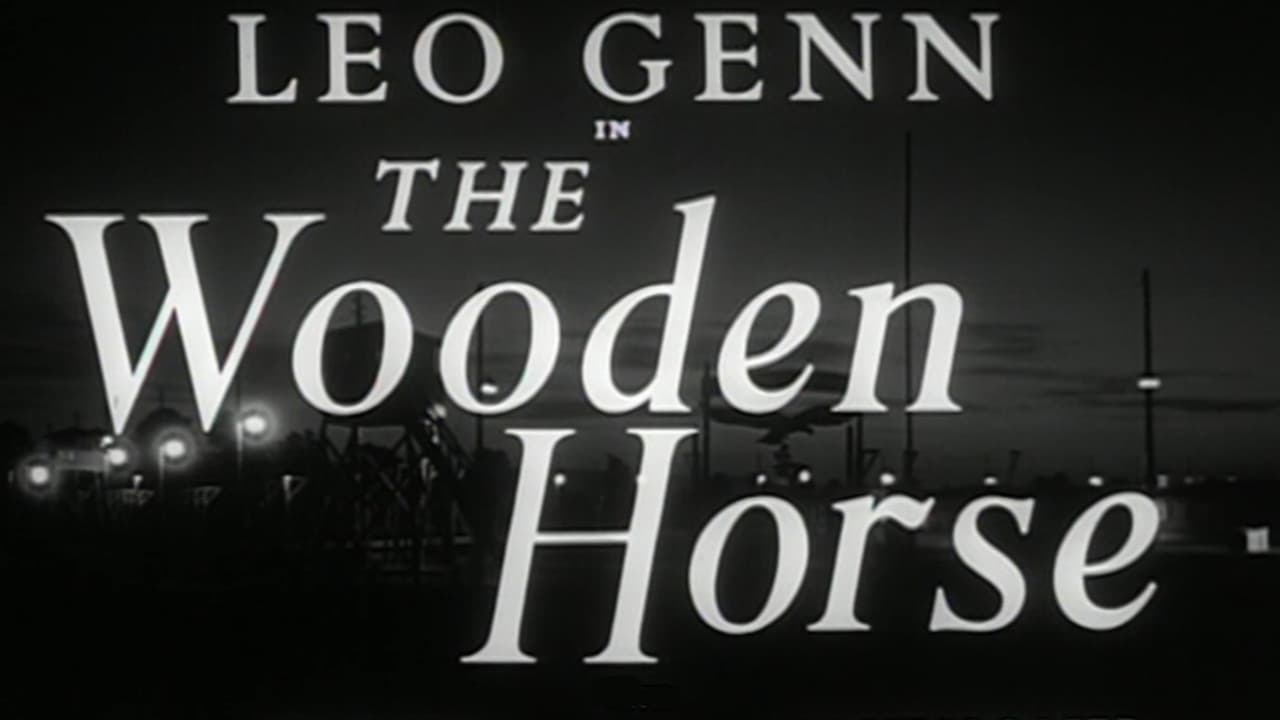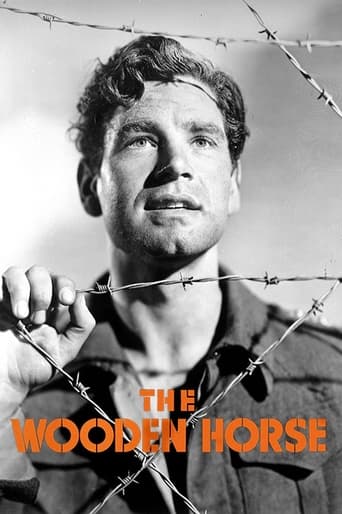

Intriguing WW 2 POW movie.Set in a German POW camp, Stalag Luft III, in 1943, the story of a daring escape attempt. The British POWs, mostly airmen, have been searching for a way to tunnel out of the camp. Their huts are too far from the perimeter for the conventional methods. They hit upon the idea of setting up a wooden vaulting horse in the middle of camp, ostensibly for exercise, but in reality as a starting point for a tunnel...Quite interesting and exciting story. The use of the wooden horse is a bit far-fetched so it helps to suspend disbelief. Is quite an ingenious idea though and the planning, building, scrounging and subterfuge that goes on around it is quite engaging. The best part however is what happens once they're out - very suspenseful.However, The Wooden Horse will always be compared to The Great Escape, and this doesn't help The Wooden Horse. The Great Escape has more action, bigger names, the coolness of Steve McQueen and is based on a true story and has better production values. This all said, The Wooden Horse must claim some, if not all, credit for The Great Escape being made, as it started the POW escape genre and The Great Escape, 13 years later, was the high point of it.
... View MoreIt begins in a leisurely way, with British POWs in a camp, chatting and grumbling and being a little impudent with the German guards. On the whole it fits into the often splendid genre of post-war British films.The POWs are more bored than abused. The sleeping quarters each house about four men. They sleep on comfortable bunks and wear pajamas. There's even a piano somewhere playing Mozart. In the hospital there are Beethoven records. But, driven by a desire to spend money, find a girl, and get a good meal, they begin to build a tunnel out of the camp.The hut nearest the wire is too far away to use as a base, so the men construct a wooden horse to use on the fields outside; that is, a vaulting platform with a padded top, the sort of thing many of us had to cope with in high school gym class. Each day, when the men are not busy peeling potatoes, one of them will be hidden inside the hollow box-like structure and work on the tunnel, disguising the entrance with dirt-covered sandbags. During the practice runs, most of the POWs leap the horse easily but one continues to lose his nerve at the last minute and smash belly first into the structure. He's demoted to cheerleader.The German guards are not the raving maniacs of the war years. Most are reasonable and, as in real life, a bit old for combat and worn out. This doesn't stop one of the Unteroffiziers from examining the vaulting horse in private and, after looking around to make sure no one is watching, he leaps across the top lengthwise, outdoing all the Brits, and grins with silent pride.The work proceeds and there are moments of tension, as there must be in any movie about men crawling fifty feet through a tiny tunnel of dirt. No power on earth could get me to do it.As it turns out, two men, Leo Genn and Anthony Steele, escape to the forest, thence to Lübeck, an ancient and distinctive northern city that gave us Günther Grass and Thomas Mann. Some location shooting was obviously done around the city's landmarks. The pace picks up. Narrow escapes up alleys and over fences. Evil forces are closing in on them but they finally make their way to a Danish freighter where they are welcomed aboard. Danish freighters can be fun. I accompanied two linguists aboard a freighter this size in Nova Scotia. The object was to see how the pronunciation of a sentence in French would be altered by a Danish accent. "Selon notre dernier rapport la besoin est très bon." I don't know about the business but the festivities were gay and we staggered off loaded on Akvavit. (I just threw that in for lagniappe.) Copenhagen, of course, was occupied by the Germans in World War II and conditions remained dicey for the pair. The first violent scene takes place in the boatyard of a nearby fishing village when Genn kills a German guard, an act that leaves him chagrined.The escape are close but Genn and Steele finally make it to Sweden, which, unlike neighboring Norway, remained neutral for reasons having to do with the transport of raw materials. Safe at last in the arms of the British embassy.The opening scenes, the tunnels and so forth, have now become familiar fare in these escape movies, but the twists and turns of their escape through Germany and Denmark are engaging enough. I admire the photography too, and the treatment of the enemy, who are rendered as human instead of as cartoon figures.
... View MoreSaid my father sagely as we strode out of the Plaza Arcade and across the High Street into the teatime darkness,I hoping to get a glimpse of the day - old chicks in "Sainsbury's" window,he hoping to get a cup of tea and a hot apple pie in "Lyon's" before they closed. To be fair to staff at Stalag Luft 111,that was his default position for any perceived failure by those in authority. The Polio epidemic wouldn't have occurred if Rommel had been in charge of the Health Service and those contemporary fear - figures the Cosh Boys(later to be followed by Teddy Boys,Mods and Rockers and,ultimately Punks)could never have flourished in a justice system with Rommel at the helm. Having fought the German Field Marshal in North Africa(not hand to hand you understand,although he often distilled the "Last bit of unpleasantness with the hun" as he termed it,down to Desert Rat (him) Vs Desert Fox (Rommel)for whom he felt a most un - British reverence. Certainly the Germans guarding Messrs Genn,Steele,Tomlinson et al seemed to be sleeping on the job as our heroes casually dumped the soil excavated from their escape tunnel from their trouser pockets and literally kicked over the traces. "The Wooden Horse" was the first of a seemingly endless series of films showing British officers kicking scruffy footballs about like demented 9 year - olds,dressing up as women to entertain their chums and digging holes in the ground. In retrospect the POW genre veered from the sublime - "Bridge on the River Kwai" to the bizarre - "Merry Christmas Mr Lawrence" via the frankly camp(sorry) "The password is courage" to the overblown and noisy "The Great Escape". But it's gestation came with the true story of an ingenious escape engineered by some necessarily athletic officers that required them to engage in hearty gymnastics whilst tunnelling a jolly long way under the perimeter fence. 65 years have added a piquancy to this cheaply - made workmanlike effort by a journeyman director. The actors are fondly - remembered - except for Mr A.Steele who appears to have been unfairly forgotten after an Icarus - like career. There followed a deluge of books telling of more and more unlikely escapes from the clutches of the Master Race that made one wonder how they contrived to make the war in Europe last six years (well,four if you're a Yank). This film should be shown to Angela Merkel to remind her that her Vaterland didn't always have things all its own way. as we walked down a poorly - lit Swan Lane father kept an eye open for lurking Cosh Boys and I envisioned day - old chicks tunnelling their way out of our chicken run at home. No,nobody could make a film out of that - could they?
... View MoreIn 1943, a group of RAF Officers, including Eric Wiiliams, decide to escape from a POW camp using a Gymnastic Vaulting Horse in the courtyard. In 1950, it was decided to film his account, and it kick-started a peculiar British Film Genre- the Military Prison Camp story that reached its apogee in Danger Within (1959).The Wooden Horse is one of the quietest films I have ever watched. There are no great dramatic moments, but a steady storyline eventually builds to a climax that has more tension because the story doesn't give way for unlikely drama, jump cuts or jacked up (somethings about to happen!) music. It is utterly of its time and works beautifully.Leo Glenn, Anthony Steel and David Tomlinson lead a curiously low key cast of extras and (I suspect) non-actors. Without exception, all are constantly mono-tonal and quiet. They keep emotion out of their roles. As so many were, until recently, ex-service, I suspect they recreated their war time roles as 'Officers and Gentlemen'.This unemotional approach does not detract from any dramatic tension. On the contrary, unlike most Wartime Escape Films, the story doesn't end at the barbed wire: and that fact alone keeps me glued to the end.
... View More